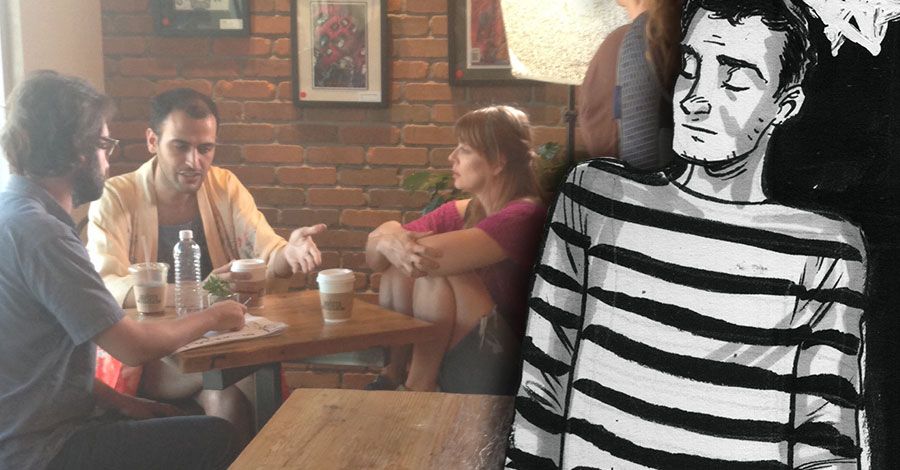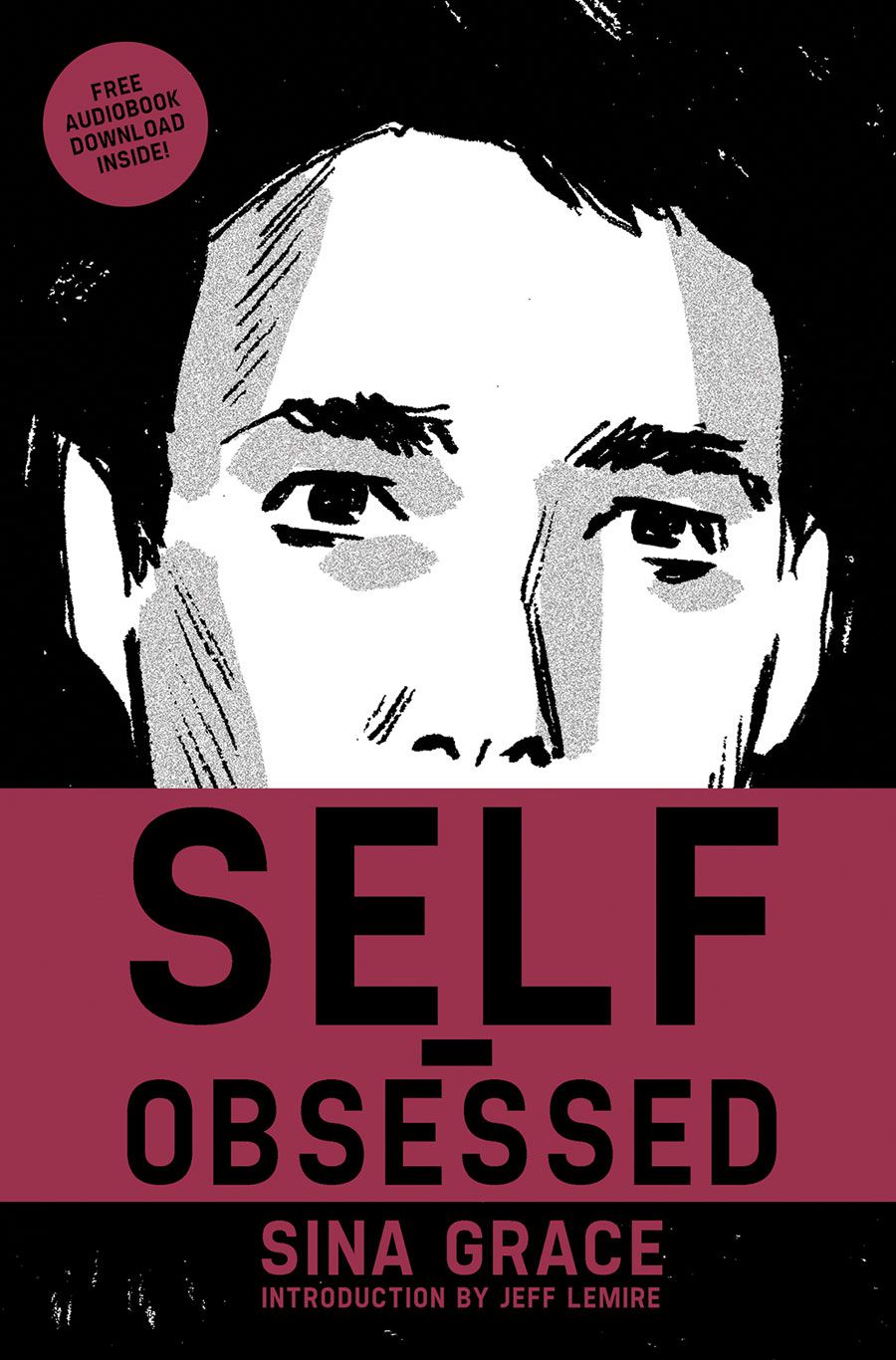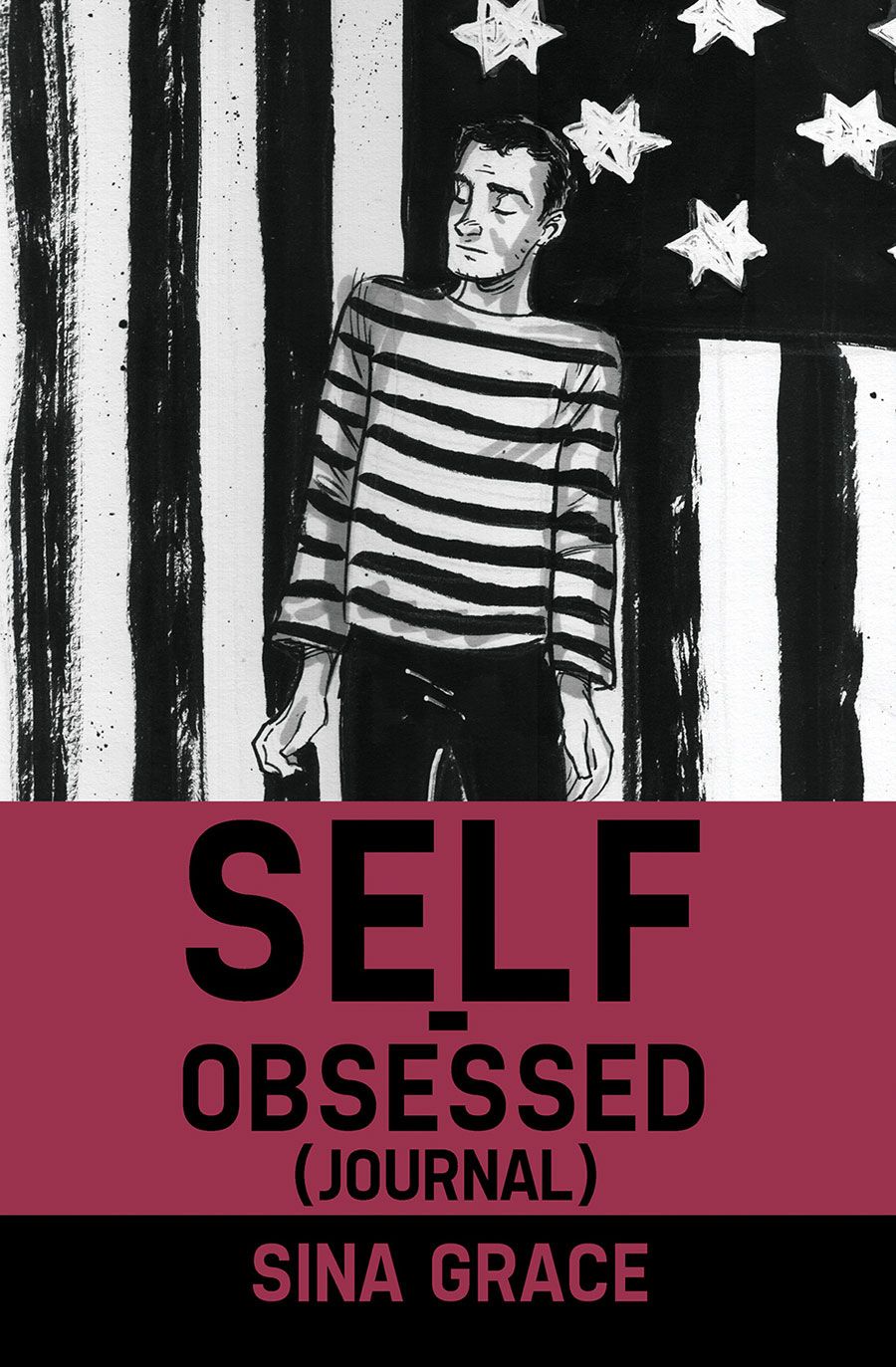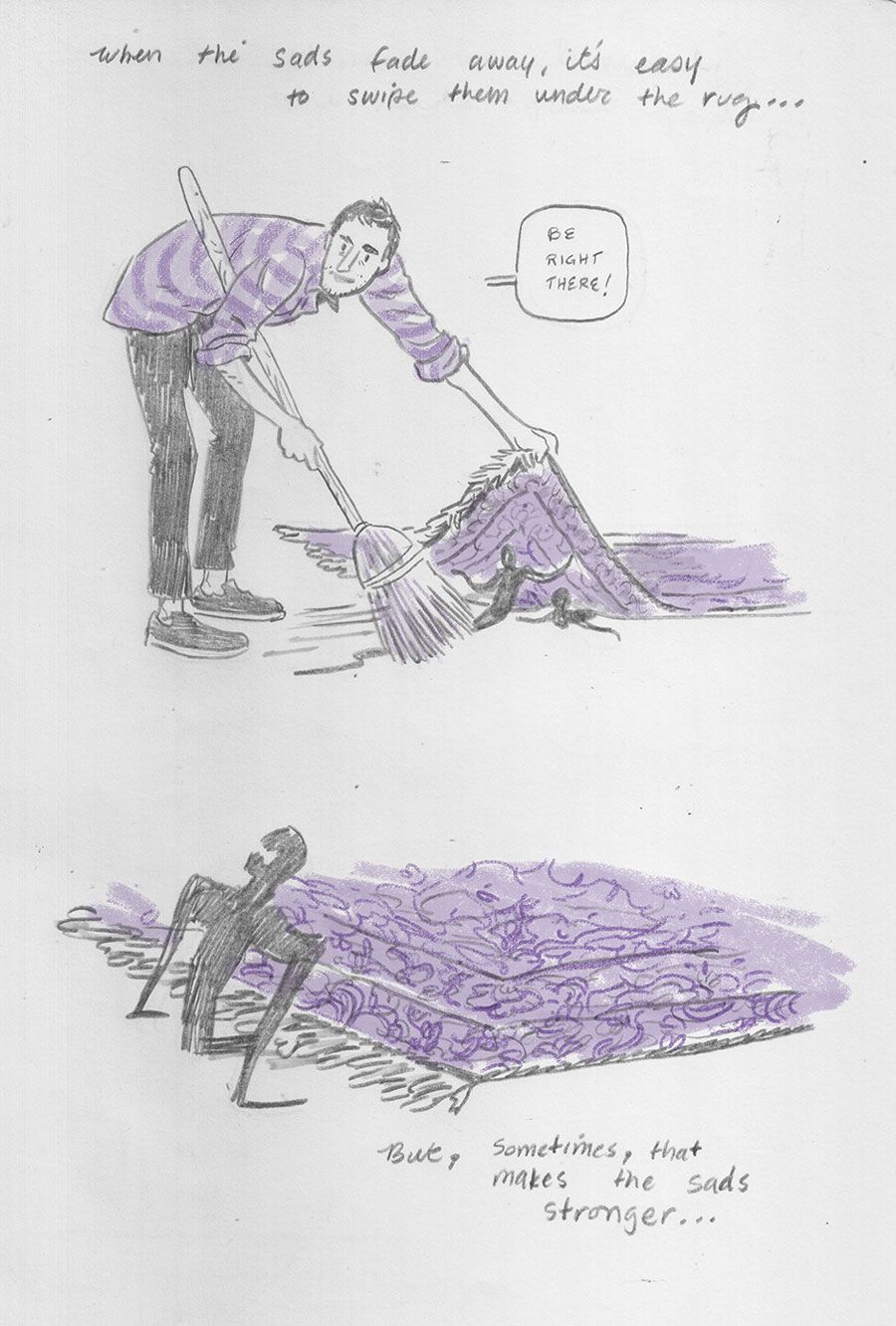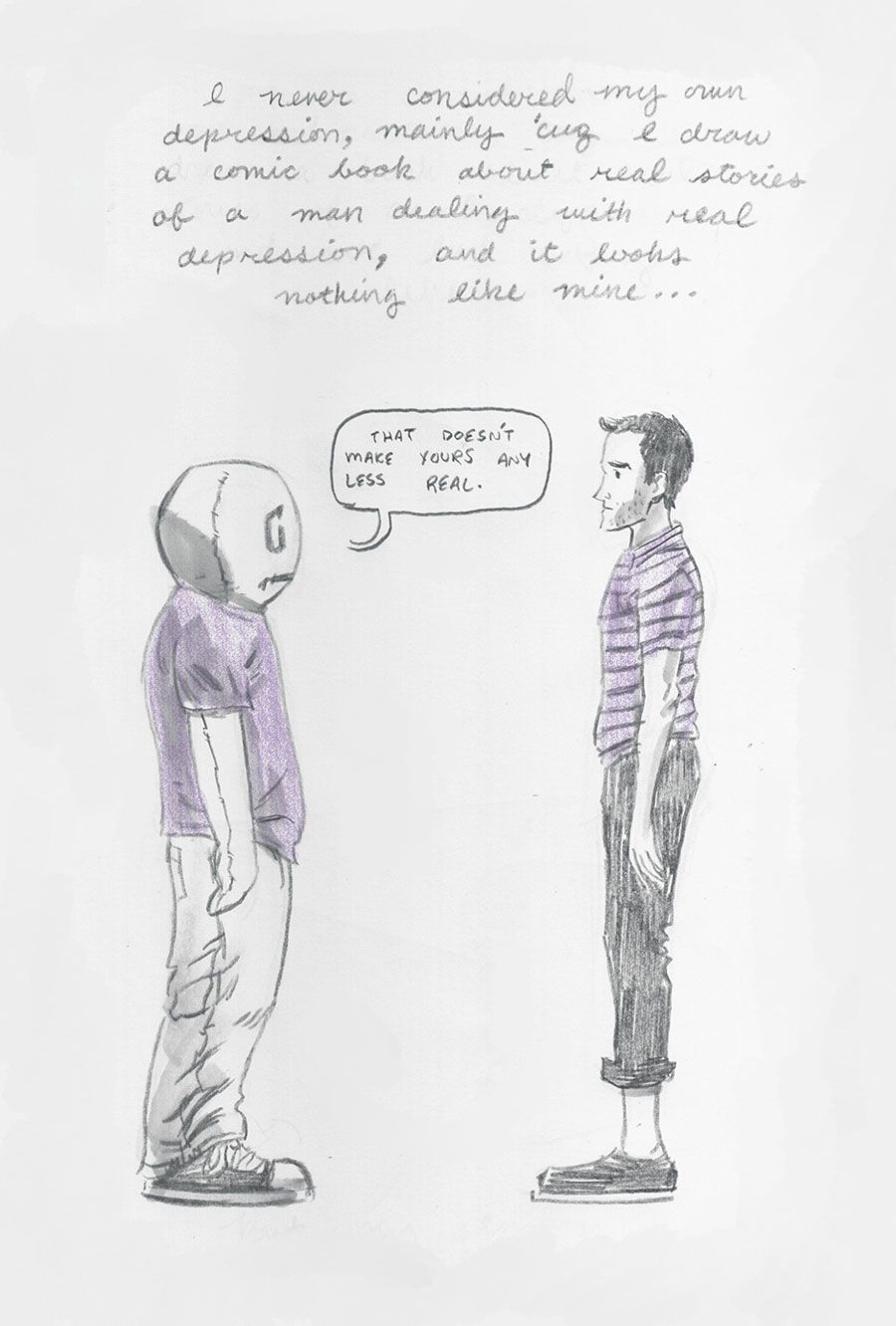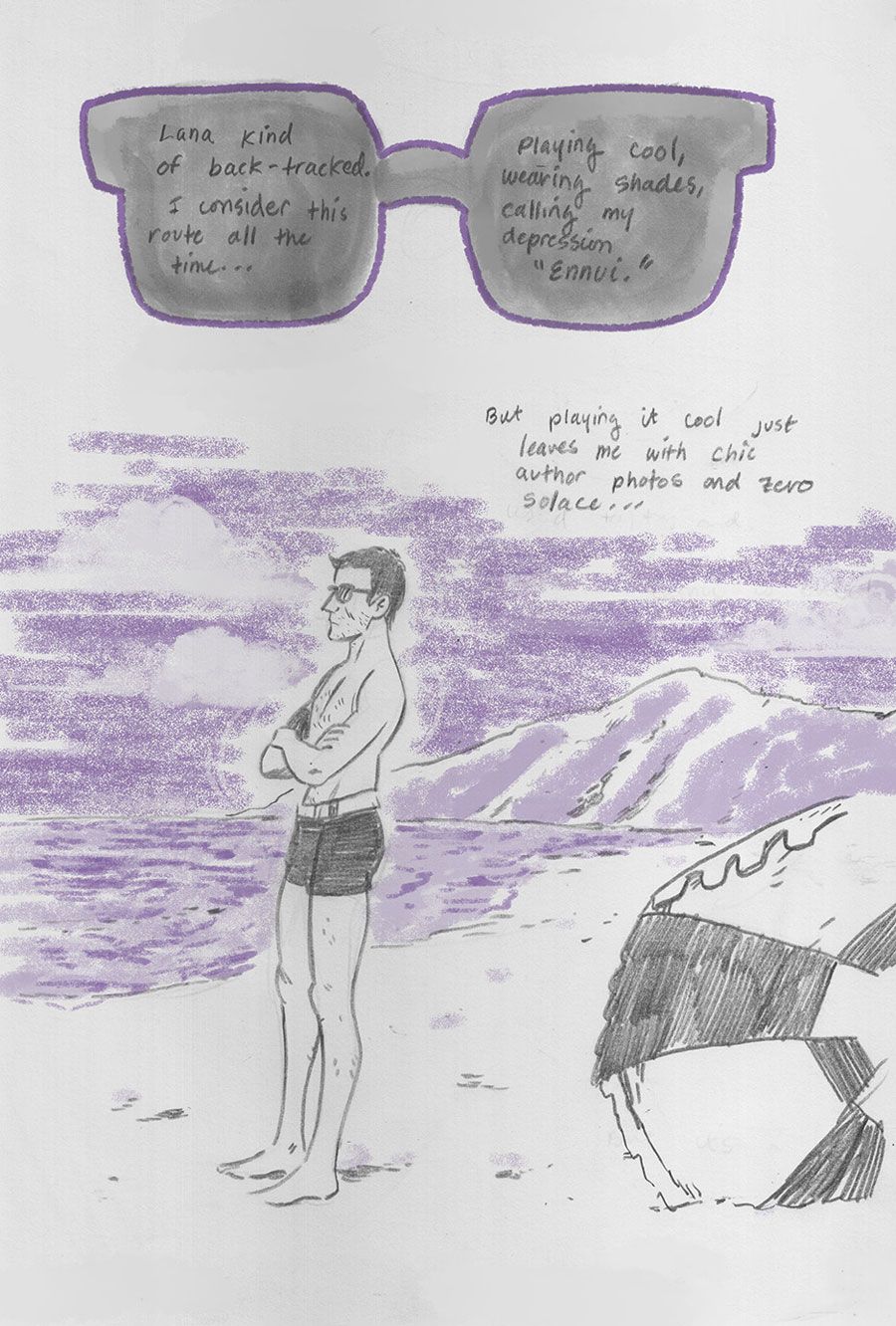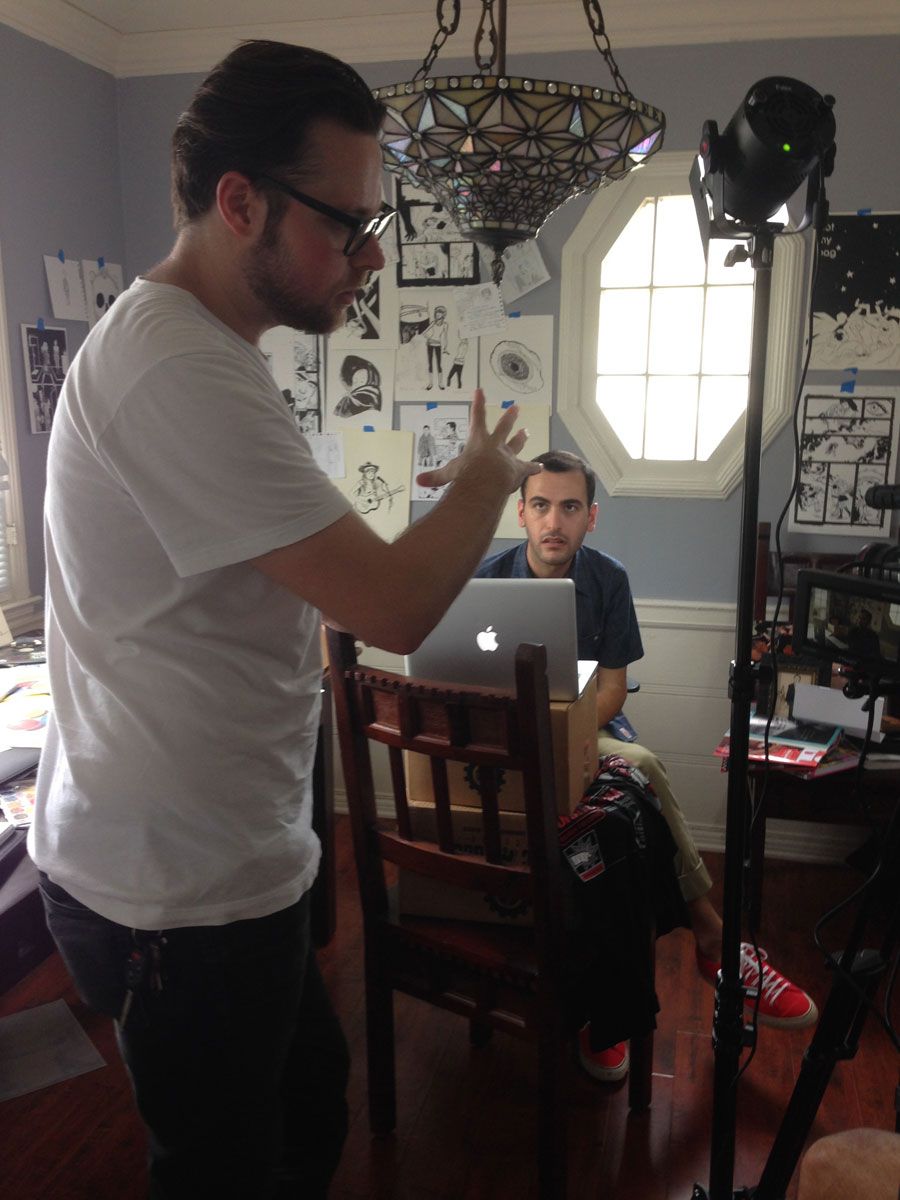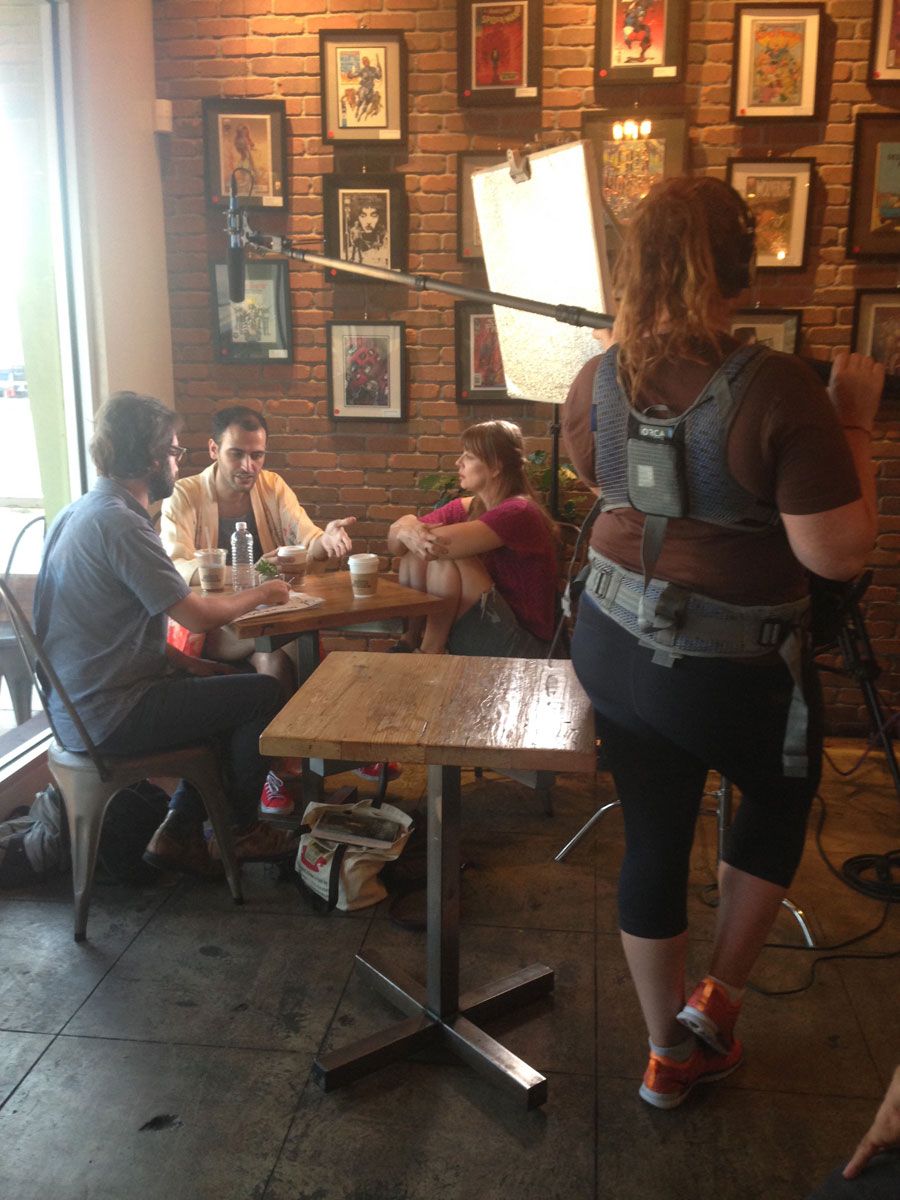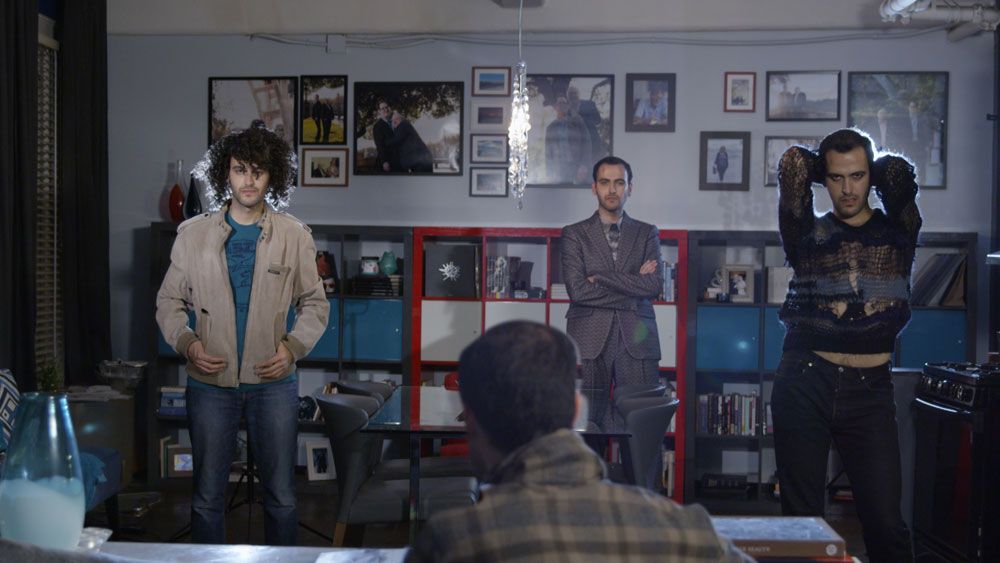It's probably impossible to make your living as a comic book creator without becoming at least a little self-obsessed. Between scrambling for jobs, promoting their work on Twitter and selling books at cons, creators have to spend a lot of energy convincing others that their projects are worth the read. And all that is on top of the sheer Herculean effort of making comics -- nobody could put in that kind of work day in, day out without having at least a little bit of obsession.
And then there's Sina Grace, who is taking his own self-obsession to a whole new level.
WATCH: Sina Grace Gets "Self-Obsessed" in New Trailer for Comic-Based Web Series
After working as an editor at Robert Kirkman's imprint Skybound and illustrating books like "'Lil Depressed Boy" and his own "Burn the Orphanage," Grace has struck forth into the world of auto-bio comics with the Image Comics-published "Self-Obsessed," and is even adapting some of the comic's stories into a new web series, starring himself, "Buffy" alum Amber Benson. Grace spoke with CBR about putting his life on display for readers, wrangling his friends into bringing "Self-Obsessed" to the screen, and how telling personal stories is pushing him to be his best.
CBR News: What went into the decision to do a book like "Self-Obsessed," which is a fairly raw, not always flattering look at yourself?
Sina Grace: My other creative pursuits weren't quite clicking with audiences in a way that I could rely on sales to make a living. It took a lot of encouragement from my pals in the industry to trust that whatever I had to say on my own would work. It was a super-intense turn to kind of lay it all out there, but it also felt really good to walk around and look at someone who's read it and think, "You know exactly how stupid I am, and you still want to hang."
What were the risks to telling such personal stories? What did you learn about yourself?
Grace: The main risk I felt making the book was the constant nagging thought, "If this doesn't work, I'm a complete failure. I can't cut it in the industry."
What I learned was, I've been looking at my life on the wrong rubric. By living whatever life I choose for myself, I have to accept that I'm closing the door to certain securities. If I move forward making one or two personal books a year that I deem special and a part of my heart, I have to accept that my income is gonna be pretty small, and that I won't have mainstream access or universal appeal. If I stuck to what I was doing in 2014 (following paychecks as a freelance artist) then I am sure I could have lived happily doing random commissions for my 30s, but the work would seem hollow and probably mediocre.
I used to want to be the greatest, now I'm more focused on being my greatest.
What does it mean for you to be your greatest?
Grace: At the very least, being my greatest means moving with my best foot forward, and leaning into what makes me "me" (artistically, fashion/ hair/ pop culture/ queer culture, etc). I had an awesome conversation with Colleen Green. She said this really inspiring thing to me about how she's the only person who validates her music -- not fans, not a boyfriend, etc. I was the complete opposite. Making stuff that makes me happy ends up doing way better in the long run than an X-Men drawing to impress a cute boy.
What parts were you the most nervous to address? And which were the easiest?
Grace: The parts of the book where I was most scared to address were the bits about sex itself. It's not like I go into anything too taboo, but there are still a lot of folks who just don't wanna hear about gay stuff, or even look at "inappropriate" content in their comics. I just had to shrug it off and trust that the readers I shared earlier drafts with would steer me clear of making a fool of myself, and that it may not be that big of a deal that I talk about wanting to hound on cock. I really love the one-page stories I wrote to thematically introduce my Thought Catalog essays. They were so dense and completely bridged a bunch of little themes running around.
In terms of the sex bits, did your concerns shape how you presented it? Do you feel like gay sex and romance in particular are held to a different level of scrutiny?
Grace: Honestly, I don't have a proper insight to these questions. I wonder why my comic makes people uncomfortable, and "Sex Criminals" is a phenomenon. Maybe "Self-Obsessed" is a confrontation of identity/sexuality, and "Sex Criminals" is a celebration? That could be it. What I will say is that friends come up to me about certain admissions and they're like, "Me too, bruh, me too."
I always figured people would look at gay sex the way I look at straight sex: completely amused, occasionally aroused. I just don't think I present it salaciously, and the book kind of constantly warns you: if you don't like it now, you're not going to be persuaded otherwise in 20 more pages.
You had a career in comics before being a creator--how did you weigh what you could (and should) reveal about the industry? How did that impact your ability to be honest or self-edit?
Grace: When it came down to talking about the inner-workings of the industry, I followed my instinct and talked only about what did a service to the material. If talking about my experiences bolstered certain themes, then they went in the book. I completely bypassed a chapter in my life that I'm sure would have made for more eager reading, but that's because it would have been stories about me witnessing someone else's story. The chapter where I edited comic books seems more about me working for others, not about me working on -- or for -- myself.
There has been a lot of talk lately about the transition from comics employee to creator. How do you think that relationship evolves? How did it change for you, and what do you think the professional boundaries should be?
Grace: My opinions about the industry are sort of muddled in what I think is right and true, and what I also know is the right thing to do. We work in such a small and collaborative industry, and as a result, every voice really counts. It's tough, because some of us are working to please a couple hundred or a few thousand loyal readers, while others are servicing the needs of multi-billion dollar corporations -- and still the money is so small amongst all of us that there aren't the resources that the music industry has, and we're all still piled on top of each other. It's a strange time. 

At the end of the day, I think maybe we all have too much access to each other? When a band tours, they're only in any one spot for a few hours, so all interactions are cut down. For professionals and journalists and fans and retailers in comics, we do conventions that last up to an entire calendar week. That's a bit too much time to have access to your heroes, and everyone kind of just notices how tired and human we all truly are. There's no room to create legends, just scandals.
What have you seen it take for someone to become legendary in comics? And how do you keep yourself focused on what you want to create?
Grace: Alan Moore is a legend, but Alan Moore is actually all of the legendary things people say about him. He also avoids conventions and interviews, so all we have as fans are his books and the occasional PR photo where he looks like the coolest alchemist on earth.
To become that iconic in comics, I think it takes being dogged in not only creating singular work, but also evoking those same emotions in everything you do -- cons, interviews, tweets. You have to somehow be yourself and be able to build an audience. Kelly Sue DeConnick mastered it. She rocks being in her skin, and creates work that slays.
Both of those examples are also incredibly smart people. Reading, researching, learning -- super-important stuff. I love that Lana Del Rey has been going on about Elon Musk and scientific theory, she's sort of winking at us and proving that she's been in control of the media circus that is her career. It's rare that legends occur by accident.
For me, I just stopped chasing paychecks as hard. I had to sacrifice a lot of luxuries -- like having my own place and a real bed -- but I still have the little bougie necessities that remind me my life is nowhere near Lars Von Trier-level sad. You forget super fast that scraping by in a big city is still a big deal in the grand scheme of things.
And now you've transitioned "Self-Obsessed" into a web series--tell me about that!
Grace: Oh, dang! What I can reveal so far is that I wrote, produced, and starred in a web series that will be coming out in five episodes. Daniel Freedman, my co-writer/co-creator on "Burn the Orphanage," directed the whole thing. I was able to rope my friends Amber Benson and Adam Busch to play themselves -- or versions of themselves, and Jon Gabrus did a remarkable job playing my ex, "Greg" (not an existing dude IRL).
The general plot is, a comic artist named Sina discovers his book's been cancelled, he has zero savings, an ex whose spirit still haunts him, and seemingly no hope to get him out of this funk. It's shaped up to be quite a lovely project, and was a lot of fun to start a story with the character already in the thick of his dilemma.
Was acting something you'd always wanted to try? What encouraged you to pursue it for the series?
Grace: There's a little mental bucket list I have for before I turn 30 -- "acting" isn't necessarily on it, but "putting out a video project" is. We all know I'm kind of a ham. I don't like to have any lingering "what if" or "if only" feelings about my life choices, so I knew that one day I'd just have to put my butt in front of a camera and find out definitively if there's some part of me that should be there. I love shows where the cast is just hyper-meta versions of themselves, like "Broad City." They seemed so comfortable and transcendent. So, I pursued an iteration I could handle with my limited resources and incredibly talented friends. Everything just felt so palpable -- so right. You always have to follow that gut feeling when you do creative work. We shot the whole thing on a shoestring, but so many allies volunteered their movie-making magic to keep "Self-Obsessed" looking classy. It's on YouTube now!
How did Amber influence the project?

Grace: Amber has so much wisdom and experience when it comes to creative industries and how to keep your head on through and through. I strive to have her values and self-respect, so she's who I turn to every time I hit a wall with my career. Given that Amber was the person I went to when the events that the web series occurred IRL, I had to invite her along. She was so gracious and receptive to the material. In a way, I needed her there to reaffirm me that acting and making a new media project wasn't a huge disaster. Do you see the running theme of me always kind of needing someone to tell me that it's gonna be okay?
Amber and Daniel, how did both of you get involved?
Amber Benson: I had to beg Sina to put me in his book and subsequent web series. I showered him with shelled pistachios and pretzel croissants and marshmallow toast. He still wouldn't capitulate, so I threatened him. Everything was peachy keen after that.
Daniel Freedman: Not only did Sina and I co-create the Image series "Burn the Orphanage" together, we also went to high school together. Though our recollections of those years are blurred, Sina claiming I was some kind of bully, we have a long history together. When Sina started talking about doing a web series, I figured I was a shoe-in to direct, but that wasn't the case. After apologizing for said bully years, he finally agreed. From there, we formed who he needed to be onscreen.
You're both in a unique position to see the real Sina, and the version of himself that appears in the comic and series. How different is Sina's interpretation of himself in "Self-Obsessed" versus real life?
Benson: Sina is just as adorable and charming in real life as he is on screen. I'm not sure I've seen him in a fanny pack in real life, but if it was an Alexander McQueen...well, there's no stopping him then.
Freedman: Sina the real boy is very much like Sina the character. This wasn't the first time Sina put himself in a story, so his character and his character have been evolving in parallel states for some time. They are almost the same person and yet couldn't be more different. Its as if Sina looked into a mirror and saw his reflection looking back, then went through the mirror into his reflection's realm and had a quiet chat about things over lattes and Sour Patch Kids. Eventually, he returned and said he was ready, though I question which one really came back.
What has been the funniest thing to happen on set so far?
Benson: Nothing funny happens on set. It is a super-serious show, and we aren't allowed to even crack a smile when we're filming. Otherwise, Sina and Daniel will take you aside and quietly beat you in the bathroom.
Freedman: Jon Gabrus. Though his scenes as Greg the Ex are rife with drama, he couldn't have been more fun to work with. Not only did he make me laugh, he made the entire crew laugh.
Sina, how does the medium of film allow you to tell the story differently? How does it challenge you as a storyteller?
Grace: Doing a visual project is such a crazy endeavor in that no matter how skilled or talented you are, you have to collaborate with others. The book is 100% me -- writing, drawing, lettering, etc. I had friends help out on some of the design, but you get what I mean. On the "Self-Obsessed" web series, Daniel and I had a director of photography, a producer, two sound people, a lighting guy, a script supervisor, a hair & makeup artist, and a PA standing behind the camera. That doesn't even include the cast, or extras, or folks who graciously offered up their homes and storefronts as sets, or even the friends helping with post-production! Do you know how many hours our editor Joe had to look at my frickin' mug!? Oodles! Only Daniel and our script supervisor had read the book, so I had to trust that he understood what I needed from this project, and to communicate it to all of these people working for my story. It's humbling, to see people putting in that much time and energy to make a dream come true.
I had to be chill about being loose on the facts. Both for storytelling and pacing purposes, and for respect to people who can be affected by the story, the 30 minutes people will be watching are not a docu-series about my life. I was able to take very real things that happened and dial the fun bits up to 10. It was a lot of fun watching Daniel bring up these truly awful depictions of me to get Jon Gabrus in "angry ex" mode. It's like, "Thanks, man."
What are you hoping to communicate in the film format that you haven't been able to in comics? Is there more acting in your future?
Grace: My goal is to just use the web series as a means of getting people to buy the book. The message of "Self-Obsessed" is that it's worth it to sift through the emotional garbage, because you'll find a better version of yourself at the end. That message doesn't have to be just for comic readers or comic artists. It's tiring to promote a book by traditional means, and video content makes its way in front of people's eyes a lot quicker than comics. In all honesty, I wouldn't mind doing more "Self-Obsessed" stories, both as a web-series and comic!

